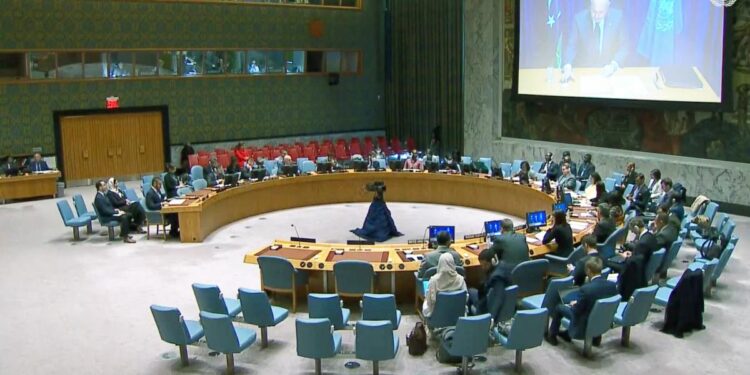International Criminal Court Prosecutor Karim Khan has pledged his continued commitment to delivering justice to the victims of mass atrocities committed in Libya.
He said his office has significantly increased investigative activities, including evidence collection, engagement with and support for witnesses, and contacts with international actors, civil society organisations, academics, and experts.
Outlining the achievements of the Office of the Prosecutor (OTP) to the United Nations Security Council (UNSC) on November 9, 2022, during his briefing on the 24th report on the situation in Libya, Khan said that for the first time since 2011, there has been a regular presence by OTP’s staff in the region, “significantly strengthening its ability to deal with the practical, logistical, and security challenges in this investigation in a flexible manner”.
“In the last reporting period, I can announce that there have been over 20 missions to 6 countries, in which a variety of evidentiary material has been collected and the promise of great engagement has manifested itself in various ways,” he told the UNSC via video link from Tripoli, Libya.
He said that in June 2022, Deputy Prosecutor Nazhat Shameem Khan, who is responsible for direct oversight of the Libya situation, conducted a technical visit to Tripoli in furtherance of the OTP’s renewed action strategy.
In addition, in September 2022, the OTP joined a joint investigation team on human trafficking. The other members are the national authorities of Italy, the Netherlands, Spain, and the United Kingdom of Great Britain and Northern Ireland, as well as Europol.
The following month, two key suspects of crimes against victims of human trafficking and human smuggling in Libya were arrested in Ethiopia and extradited to Italy and the Netherlands, respectively. He said OTP actively assisted these investigations through the sharing of knowledge, information, and evidence, and through joint witness interviews.
ALSO READ: Face-to-face with victims of atrocity crimes: Confronting impact of war on ordinary people
The Prosecutor added that further applications of warrants of arrest have been submitted to the ICC judges.
According to the report, the ICC’s Pre-trial Chamber I terminated proceedings against Al-Tuhamy Mohamed Khaled and Mahmoud Mustafa Busayf Al-Werfalli upon confirmation of their deaths by the Libyan authorities.
During his visit to Libya starting on Saturday, November 5, 2022, Khan convened a series of meetings with Libyan authorities, including Presidential Council head Mohamed el-Manfi, Justice Minister Halima Ibrahim, and the military prosecutor.
He also visited the families of the victims of the alleged crimes. International teams have found more than 250 bodies in mass graves around Tarhuna.
Khan expressed his appreciation to the Prosecutor General for supporting his visit to the site and underlined the OTP’s commitment to supporting the forensic activities conducted by the Libyan authorities, in accordance with the Rome Statute.
On February 26, 2011, the UNSC unanimously referred the situation in Libya since February 15, 2011 to the ICC in Resolution 1970 (2011). Libya is not a state party to the Rome Statute.
The council said it was “condemning the violence and use of force against civilians, deploring the gross and systematic violation of human rights, including the repression of peaceful demonstrators, expressing deep concern at the deaths of civilians, and rejecting unequivocally the incitement to hostility and violence against the civilian population made from the highest level of the Libyan government”, which was then under Muammar Gaddafi.
The ICC has jurisdiction to investigate crimes that occurred in the territory of Libya from February 15, 2011.
ICC Pre-Trial Chamber I found there are reasonable grounds to believe that an armed conflict not of an international character had been ongoing on the territory of Libya, from at least early March 2011, between governmental forces and different organised armed groups, or among various such armed groups.
The investigation, which opened in March 2011, has thus far produced three cases, originally against five suspects, and has involved charges that include war crimes and crimes against humanity.
On November 22, 2011, an arrest warrant against Gaddafi was withdrawn after his death. Proceedings against Abdullah Al-Senussi before the ICC came to an end on July 24, 2014, when the Appeals Chamber confirmed a decision of Pre-Trial Chamber I declaring the case inadmissible before the ICC.
The situation in Libya was the second one, after Sudan, to be referred to the ICC by the United Nations Security Council, and the second ICC investigation on the territory of a non-state party to the Rome Statute.







